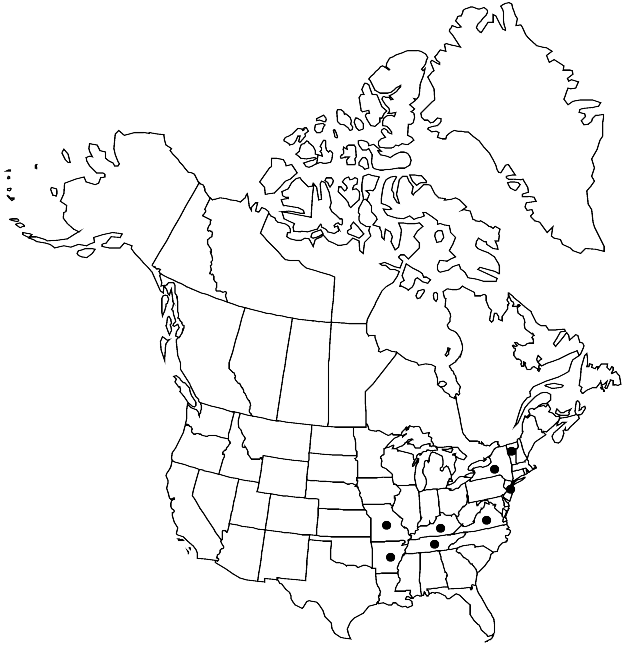Difference between revisions of "Neckera besseri"
Verh. K. K. Zool.-Bot. Ges. Wien 10: 368. 1860.
FNA>Volume Importer |
imported>Volume Importer |
||
| (6 intermediate revisions by 2 users not shown) | |||
| Line 7: | Line 7: | ||
|year=1860 | |year=1860 | ||
}} | }} | ||
| − | |basionyms={{Treatment/ID/ | + | |basionyms={{Treatment/ID/Basionym |
|name=Homalia besseri | |name=Homalia besseri | ||
|authority=Lobarzewski | |authority=Lobarzewski | ||
| + | |rank=species | ||
| + | |publication_title=Naturwiss. Abh. (Vienna) | ||
| + | |publication_place=1: 48. 1847 | ||
}} | }} | ||
|synonyms= | |synonyms= | ||
| Line 25: | Line 28: | ||
|elevation=moderate elevations (300-500 m) | |elevation=moderate elevations (300-500 m) | ||
|distribution=Ark.;Ky.;Mo.;N.J.;N.Y.;Tenn.;Vt.;Va.;Europe. | |distribution=Ark.;Ky.;Mo.;N.J.;N.Y.;Tenn.;Vt.;Va.;Europe. | ||
| − | |discussion=<p>Neckera besseri is distinguished from other species of Neckera in the flora area by its small stature and ovate to obovate stem leaves; distribution is limited to eastern North America. K. A. Wagner (1952) and R. R. Ireland (1961) treated this species as Homalia jamesii and H. gracilis, respectively, but He S. (1997) accepted it as Neckera.</p> | + | |discussion=<p><i>Neckera besseri</i> is distinguished from other species of <i>Neckera</i> in the flora area by its small stature and ovate to obovate stem leaves; distribution is limited to eastern North America. K. A. Wagner (1952) and R. R. Ireland (1961) treated this species as <i>Homalia</i> jamesii and <i>H. gracilis</i>, respectively, but He S. (1997) accepted it as <i>Neckera</i>.</p> |
|tables= | |tables= | ||
|references= | |references= | ||
| Line 34: | Line 37: | ||
-->{{#Taxon: | -->{{#Taxon: | ||
name=Neckera besseri | name=Neckera besseri | ||
| − | |||
|authority=(Lobarzewski) Juratzka | |authority=(Lobarzewski) Juratzka | ||
|rank=species | |rank=species | ||
| Line 48: | Line 50: | ||
|publication year=1860 | |publication year=1860 | ||
|special status= | |special status= | ||
| − | |source xml=https:// | + | |source xml=https://bitbucket.org/aafc-mbb/fna-data-curation/src/2e0870ddd59836b60bcf96646a41e87ea5a5943a/coarse_grained_fna_xml/V28/V28_950.xml |
|genus=Neckera | |genus=Neckera | ||
|species=Neckera besseri | |species=Neckera besseri | ||
Latest revision as of 21:39, 5 November 2020
Plants to 2 cm. Stems with branches common, flagelliform; paraphyllia absent. Stem leaves (central) ovate to obovate, flat, 1.1–1.3 × 0.4–0.6 mm; margins entire; apex obtuse to broadly acute; costa double, short, rarely single; alar cells irregularly quadrate; basal laminal cells irregularly rectangular, 25–37 × 7 µm; distal medial cells rhombic to rhomboidal, 15–18(–30) × 7–9 µm; apical cells rhombic, 5–12 × 7 µm. Sporophytes unknown.
Habitat: Limestone or sandstone cliffs, soil
Elevation: moderate elevations (300-500 m)
Distribution

Ark., Ky., Mo., N.J., N.Y., Tenn., Vt., Va., Europe.
Discussion
Neckera besseri is distinguished from other species of Neckera in the flora area by its small stature and ovate to obovate stem leaves; distribution is limited to eastern North America. K. A. Wagner (1952) and R. R. Ireland (1961) treated this species as Homalia jamesii and H. gracilis, respectively, but He S. (1997) accepted it as Neckera.
Selected References
None.